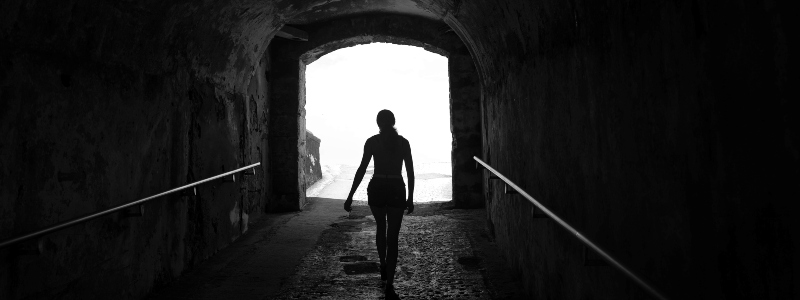Dissociation is a term used to describe the mental process of ‘getting rid of’ painful or traumatic feelings by banishing them to a ‘nothing’ place within – for good and for bad. The paradox of dissociation is that in the process of such banishment, far from being shut down, traumatic experience can take on a life of its own. Locked away, our painful feelings are not available for processing and cannot be integrated into a coherent narrative of our history. The consequent effect is that from this place these unwanted feelings may cause us trouble, without us necessarily having any idea of where the trouble is coming from.
A small child will learn early how to dissociate in the face of overwhelming traumatic experience, as a means by which to survive and to keep trauma out of narrative memory. Should that child find themselves in therapy at some later stage in their life, it is unlikely that there will be a ‘whole’ story of what happened to them available for recovery. It is more likely that memory of traumatic experience will present as disconnected and scattered fragments. Strewn across an internal landscape these scraps of memory may still be signalling distress through here-and-now symptoms: psychological, emotional, physical and relational.
Strategies for survival
There are many ways someone who has experienced trauma might attempt to discount or disconnect from uncomfortable or distressing memories and the feelings associated with them.
Emotional numbness, self-medication, overwork, addictions or psychosomatic illness are amongst the (out of awareness) strategies that can maintain the disconnect. The trouble is that when we are unable to connect to ourselves, we will likely struggle in our connections with others, and this is what can keep the effects of early relational trauma alive. When early experience of traumatic events leads to emotional disengagement and disconnection, this system of relating is likely to be replicated in the here and now, long after the original threats have passed.
Shame
A powerful after effect lingering in the shadows of relational trauma is shame. Shame is corrosive and debilitating and when in its grip we are diminished, privately believing ourselves to be defective. When a child can’t make sense of bad feelings an obvious conclusion is ‘there’s something wrong with me.’ Dissociation and disconnection, once the only option for survival, today prevents us from accessing and integrating painful feelings. This we carry as shame; a dirty little secret that controls us from within. On the outside shame might masquerade as anxiety but it’s likely an anxiety that breeds more shame: shame about the amount of work it takes to ‘keep a lid’ on things, to present a together and coherent face to the world; shame about the habits and obsessions that keep anxiety under control; shame about being isolated; shame about interpersonal difficulties. Shame colonises a fragmented psychic landscape and hijacks our interpersonal potential.
Remembering-with
Remembering, in therapy, how bad things once felt is a significant emotional risk for the dissociated client, especially when so much energy has been spent in putting difficult experience out of sight and out of mind. The attuned, sensitive and empathic therapist will understand the magnitude of risk that a client might feel. Remembering ‘with’ is not the same as revisiting traumatic events in (gratuitous) search of catharsis. Having someone bear witness to and validate all the pain, carried for so long and all alone is transformational. It is the way that pain is transformed into grief, and in its way, grief is the opposite of dissociation. In our grieving we can integrate past and present meanings and feelings, and it is in this way that we might finally lay trauma to rest.
Gerry Gilmartin is an accredited, registered and experienced psychotherapeutic counsellor. She currently works with individuals (young people/adults) and couples in private practice. Gerry is available at our Brighton and Hove Practice.
Further reading by Gerry Gilmartin –
Therapy and art… an intersection
Cultivating a tolerance for uncertainty
The importance of generosity and forgiveness in a hostile world


